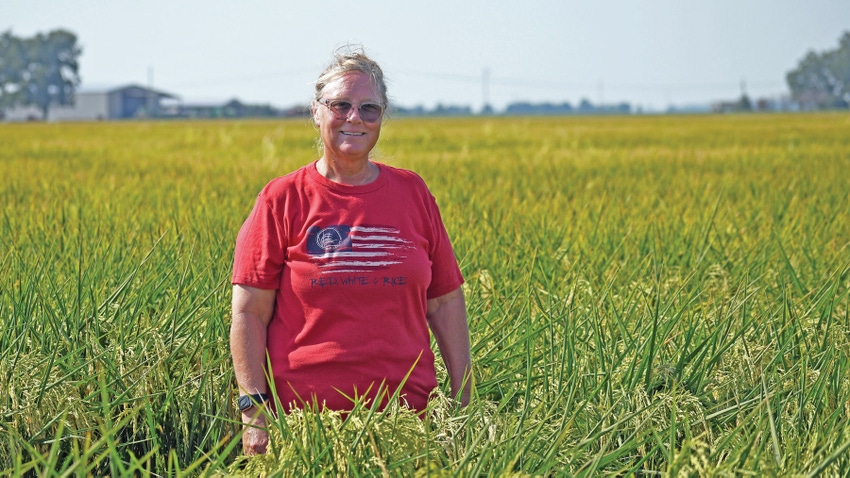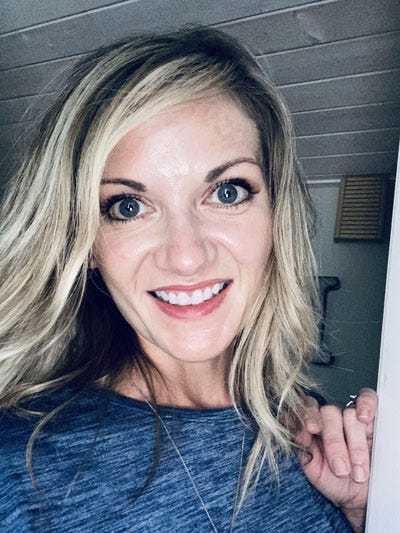
At a Glance
- Amy Beth Dowdy prepares for her 34th season scouting rice in Southeast Missouri.
- As a woman in agriculture, Dowdy was also the first consultant ever hired to scout rice in the Delta.
- Dowdy has seen many changes in rice production and dealt with personal challenges, all with the support of her "farm-ily."
Home to Amy Beth Dowdy has always been southeast Missouri. Except, she claims two homes in the area. One is in Stoddard County near the family farm where she grew up, between Dexter and Dudley.
The other is about an hour drive south, where she can be found April through October closer to the many acres of rice she walks each year in Pemiscot and Dunklin counties.
“I say I have a northern home and a southern home,” she said. “I do it exact opposite of what most people do. I go to my northern home in the winter.”
At 34 years in her career, Amy Beth has spent most of her summers scouting rice throughout the bootheel. Without question, she knows the ropes when it comes to rice farming and has been a pioneer in the industry, making a name for herself as the first ever rice consultant in the Delta.
As an advocate for U.S. rice and one of the few women rice scouts in the nation, she has seen the changes in the industry and even met personal challenges head-on. Amy Beth has also made an impression on the hearts and minds of many she has worked alongside over the years.
Getting her start in rice
It wasn’t always rice. While Amy Beth was raised around agriculture, her family did not farm rice until much later. In fact, she started out with internships in cotton while pursuing an agronomy degree at Mississippi State.
“The summer between freshman and sophomore year, I worked for BASF,” she recalled. “That was when PIX came out on cotton. They had me plant mapping all these cotton plots. Check the plot. Map the plot. That was my whole summer intern job.”
Shortly after, she worked in cotton research picking cotton plots by hand then ginning the samples with a table-top gin. Amy Beth laughed, retelling a conversation she had after work one day.
“I called my grandma and said, ‘Whoa, Grandma. That picking cotton by hand is awful!’”
Her grandmother asked Amy Beth if she was fast at picking. Amy Beth replied with a laugh, “I got faster after I poked myself while picking, but I knew I didn’t want any more of that cotton.”
From there, she accepted an internship at Terra, now Nutrien, and there her love for rice farming was born. She worked with a salesman who had two big customers just starting to grow rice. Her job was to tag along and take notes about what fields needed to be sprayed.
It was not necessarily a scouting program, she said. Instead, her job was to help make sure these rice farmers had the right products for their crops. Amy Beth continued her work for the next two years. In the third year, she graduated college and was offered a consultant position.
“I was the first full-time rice consultant Terra ever hired,” she said, noting that colleagues in Louisiana and Mississippi found it hard to believe anyone would ever pay someone for that kind of work.
Happiest in the rice field
Amy Beth loved being on the farm, which made her consultant job at the Dudley location a real eye opener. There, she was tied to the office, loading and unloading trucks and found herself passing the time in some unusual ways.
“I roller skated, I got a black belt, I made a quilt, I did all kinds of stuff,” she said. After three years, Amy Beth couldn’t take another winter in the office, and she reported asking her manager to fire her.
In 1996, she went out on her own. At the age of 21, Amy Beth started ABD Consulting, and her family questioned the move as she walked away from the securities of a company job.
“I told my daddy I had found a way to farm and not have to get a crop loan,” she said. “That’s the way I look at it.”
Amy Beth started out with 4,000 to 5,000 acres, and slowly built her business from Portageville to Hayti. Her daily rounds added up to around 300 miles in a day, in a truck she bought from her grandpa. By 2000, she was exclusively scouting rice.
Other crop consultants began working in the area, and a comradery was formed. Amy spoke of discussions they still have today about chemical programs, pest updates, and even a little friendly jesting about who has the highest yields.
She’s seen and adapted to many changes over the years. “When I started, we didn’t have the varieties or the technology we have now to help with the weed issues,” she said. Now, she deals with herbicide resistance and works to preserve new technologies that battle tough weeds.
Production practices have also changed. “We went from crooked levees to straight levees, to flat fields, and now we are putting slope back in them,” she explained, noting that she works closely with farmers to determine the best fit between row rice and levee rice on a field.
Career highlights and personal challenges
As decades have rocked on, so has Amy Beth’s career as an independent crop consultant and a pioneer in the rice industry. In 2019, her hard work was recognized when she was selected Consultant of the Year by Mid-America Farmer. Fellow Missouri crop consultant Wendell Menson nominated Amy Beth for the award.
“I asked what possessed him to nominate me,” she said. To that, Menson replied, “You’re the one who started it all up here.”
A year later, Amy Beth’s hard work was recognized again, this time by two of her farmers who nominated her for the 2020 Rice Consultant of the Year. She was selected for the annual award sponsored by Corteva Agriscience and Rice Farming Magazine.
“That was important to me. Those milestones made a big difference,” she said tearfully with a smile. These uplifting honors came as Amy Beth was quietly battling health concerns that began in 2019 with a bad tremor.
At the time, she was working more acres than ever, and doctors dismissed the condition as stress related. They recommended therapy, but Amy Beth felt there was more to it. In 2020, she went to Clevland Clinic where she received a clear diagnosis – her symptoms were caused by Parkinson’s disease.
Still yet, the diagnosis did not stop her from getting in the field. It was during COVID. Her nephew Adam was out of school because of the pandemic, and he tagged along as Amy Beth scouted rice acres while adjusting to her medication.
Amy Beth informed her farmers of her diagnosis and the medication side effects. She wanted them to know in case they noticed a change in her behavior. She told them, “If I don’t think I can do the job, I’ll let you know.”
Indeed, she could do the job. Amy Beth’s determination proved that Parkinson’s could not slow her down.
“It is no different than someone having to take heart medication or anything else,” she said resiliently. “I just have to be careful, and my farmers really look out for me.”
Looking out for each other
Amy Beth also looks out for her farmers. She takes it seriously and enjoys watching the hard work pay off during her favorite time of the year – harvest.
In the fall, she’s likely found riding a combine or parked on the turnrow, monitoring crop yields. That’s also when Amy Beth discusses the past season with each farmer and plans out next year’s rotation.
She maintains a great working relationship with her farmers and with their families. “I have worked with most of my farmers for over 20 years,” she said. “They are all such great people.”
Amy Beth fondly told stories of photo opportunities in the field, conversations with farm wives, and watching their kids grow up. Then she said with a grin, “I say, they aren’t my family. To me, they are my ‘farm-ily.’”
About the Author(s)
You May Also Like






